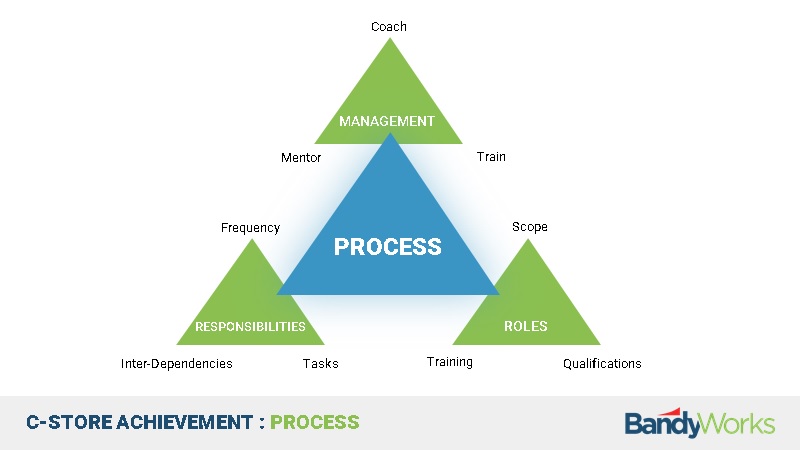
August 10, 2023
Given the challenges with c-store staffing, c-store operators benefit by addressing the impact of c-store onboarding debt. All business are impacted by their ability to hire, train, manage and develop their staff. The recent challenges, such as Covid, created many changes to the working environment and significantly changed the labor costs and work expectations. Just keeping stores open was a very high priority and many companies had to choose between on-going operations and desired hiring, training and management practices. The ongoing need to maintain staffing along with the continuing impact of the pandemic and the economic changes make onboarding a critical part of c-store operations.
Onboarding starts with the hiring process. The candidate’s selection may overlook known issues, or may not verify that the candidate is a fit for the job. Of course, in a staffing crisis, it is tempting to make exceptions just to get a body in the store. However, if there are missing skills, attitudes or situations that limit work attendance/performance there is a cost. This cost is one example of onboarding debt. C-store operationas require strong onboarding – it takes time to provide and time to complete. Putting staff to work that are not fully onboarded means risking rework, bad service or making other staff do more.
Onboarding Takes Time and Resources
Onboarding debt will have to be paid. It may mean the manager has to do more work, other staff must cover, or the service will degrade (e.g., shorter store hours, poor service, incomplete work). Once hiring is done, then the work to ensure the new hire knows the job begins. Having procedures, explaining the schedule, establishing the company expectations for its brand, and level of service must be addressed. Of course, giving the new staff the opportunity to work initially with the oversight and guidance of experienced staff is basic minimal onboarding.
Obviously, the best companies do a lot more. Those initial training items that are skipped, rushed or improperly completed reduce the capability of the new hire’s knowledge and skill. Onboarding deficiencies can be made up with experience, retraining, extra hours and learning the job. However, the onboarding costs will be paid: either by other staff and/or the customer’s experience.
The Impact of C-Store Onboarding Debt
C-store onboarding impact is easy to see when not done well. Staff are overworked, managers become frustrated, turnover grows, and the work environment is not pleasant. The debt includes:
- Manager overload
- Bad customer experience
- Inneffective loyalty utilization
- Overly dramatic/unpleasant work environment
- Lost customers
- Lower sales
- Higher overtime
- More shrink
- Increased fines
- Run-down physical locations
Paying Off the C-Store Onboarding Debt
There are many ways to pay the cost of onboarding. Many argue cost increases the longer the full onboarding is delayed. These onboarding tasks address:
- Hiring
- Alignment
- Process
- Works Skills
- Practice/Feedback
- Mistake Assessment
- Personal Goals
- Personal Needs
Hiring
Hiring is the start of onboarding. Short cuts with hiring multiply problems during the initial training period. Simon Sinek recommends brutal honesty when recruiting and interviewing. In order to have a fit and achieve alignment with the team member, it make sense to allow candidates to self-select. Further, the interview process should provide questions, interactions, and enough exposure that both the candidate and the company understand if both would like to be on the same team.
It takes more time to pick and there may need to be an earlier start, but without a fit the later work to attempt to force good teamwork may be much more expensive. Worse, it may mean that the new hire quits (or could be fired in really bad situations) and require the entire process to start again. Repeated training, slow learning or poor performance may result and thus begin the onboarding debt
Alignment
Building a team is one of the results of strong onboarding. As stated in the book, C-Store Growth Mindset, teamwork requires purpose, trust, and time. Having candidates choose to join as their personal goals and preference match the vision and culture of the company, provides the foundation for alignment. Honesty in the recruitment process regarding the way the team works together helps candidates choose. Even better, it establishes a promise that when fulfilled during onboarding creates trust with the staff member.
As with all onboarding work, time is required. It takes time to fully understand how to work and interact with team mates and customers. The training of new staff, will exemplify the true values of the company and establish the actual culture that a worker feels and delivers.
Process

Operational processes define the specific work tasks, responsibilities, frequency, and tracking requirements that guide operations. They are the specific guidelines to operate the company to achieve its vision and mission.
Each responsible team member needs to know the processes that they are responsible to fulfill. Additionally, it is important to understand other processes that support the team to know when to ask for help or escalate incomplete work that hinders their work. Team work is not only doing our own job, but assisting in communication of incomplete work (e.g., maintenance, supply, regulations).
James Clear, author of Atomic Habits, states that ‘It’s the systems and processes – the habits – that drive our success’. He emphasizes the development of focus on the things that lead to the results. For example, we may not be able to control traffic or market basket size, but we can ensure the store is clean, well stocked, and service is friendly and welcoming. As part of his research and findings there is the concept of building an identity around the habits that create success.
With great onboarding, not only are staff well trained on the work skills and responsbilities, but also the culture of delivering the work. The process serves the teamwork.
Work Skills
Training for work skills is perhaps the most understood, anticipated and tracked part of the job. We know we have to get them to sign payroll forms, learn how to clock in/out, run the cash register and where to find the supplies. What may not always be addressed, however, are the important parts such as greeting, cleaning, stocking and making the store a pleasant place to visit. The frequency, time, and approach to the job makes a difference.
It is safe to assume that a person wants to do a good job and would like to know how to succeed. Taking the time to explain the responsiblities for the job and to explain the documentation and follow-up process allows a new staff person to meet expectations. Asking questions and emphasing the key areas of concern engage the new hire.
It is important to remember that onboarding can be stressful. There may be hesitancy to ask for clarification or slow down the trainer – especially a trainer that seems to be in a hurry. The onboarding provides lots of time to address the reason why a job is done and why it matters to the customers, the manager and the other workers at the store.
Practice/Feedback
Staff feedback is perhaps the most overlooked part of onboarding. Staff that want to learn crave feedback. They do not know how they are doing until they experience the results of their actions. Further, many argue that learning does not existing unless knowledge is put into action. In order to positively influcence the impact of c-store onboarding-debt each staff must execute and use the onboarding work and recieve feedback.  This feedback is paramount to learning and positive results. Role playing situations, having new hires shadow top performers, repeating the same tasks to gain confidences are straight-forward and effective ways to train. Providing time to work with encouragement and helpful tips, allows understanding to come from action. Positive and clear feedback yields strong skills and high confidence.
This feedback is paramount to learning and positive results. Role playing situations, having new hires shadow top performers, repeating the same tasks to gain confidences are straight-forward and effective ways to train. Providing time to work with encouragement and helpful tips, allows understanding to come from action. Positive and clear feedback yields strong skills and high confidence.
Mistake Assessment
Errors and problems will happen. Every store manager understands that operating a store involves dealing with problems. The right person, with the right personal goals, aligned with the chain values, brings a great attitude to work. Mistakes are just part of the regular work. Learning and fixing issues is the key. Great onboarding and great management does not mean there are not problems. However, the problems just do not seem so bad with staff aligned towards a shared goal.
Personal Goals
Alignment, often referred to as buy-in, requires a personal connection. When managers understand staff personal ambitions, dreams, and plans it makes it much easier to connect and coach. Obviously, when someone feels they are on the path to their success, they have higher motivation and a willingness to participate fully.
One of the easiest ways to build teamwork is to spend some time with your staff. Getting to know them over time and building trust will increase the interest and desire to learn more. Great store managers know their staff and their personal goals. They help them to find the right opportunities for extra hours, new training, supervisor or management development, and days-off to attend special events. These opportunities can be offered to show appreciation and increase the team commitment. Store managers and supervisors can consider these questions as they plan their staff reviews and coaching sessions:
- How much time is allocated for managers to get to know their staff?
- What are the key interests for each team member?
- How does each person like to communicate?
- What types of appreciation matter the most?
- Which ones like to offer new ideas?
- Are there some members that see problems that make service harder?
Personal Needs
Similar to personal goals are personal needs. These items however may be more important. They directly impact how one may be able to fit into the store work. Needs may be thought about as limitations or short-comings. C-stores often work 7 days-a-week and long hours, even 24 hours a day. Some workers are only able to work certain days and certain hours. Such limitations may be due to child care, another job, transportation or even legal restrictions.
When hiring, getting the personal needs established and confirming during the onboarding can help to build trust and expectations for both the new hire and the store management. It may be useful to ask more questions in the interviews and to re-establish once the new hire starts work:
- What is your availability to work each week?
- Are there any issues that may impact your availability for scheduling?
- What are your preferred working days?
- What types of things could impact your ability to work the scheduled shift?
- What types of training do you like to receive?
- Do you have any learning limitations that our trainers need to address?
- Are you able to lift boxes, empty trash, perform physical jobs?
Related Sources for C-Store Onboarding Impact
Convenience Store News Convenience Foodservice Exchange – Investing in Food Service Success